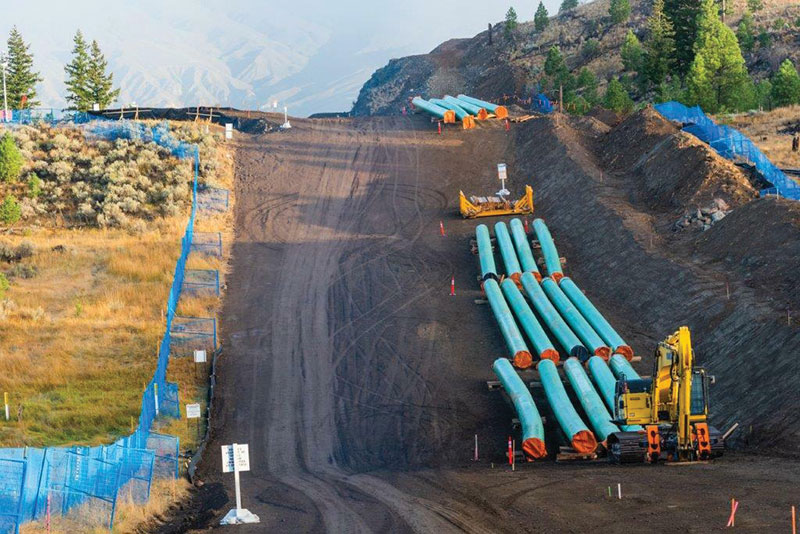Canada Faces Pipeline Squeeze Despite Trans Mountain Launch
(Reuters) — As Canada's oil industry celebrates the start of the Trans Mountain pipeline expansion (TMX), some company executives and analysts are already warning that long-term production growth plans will depend on new takeaway capacity becoming available.
TMX, which started commercial operations last week after years of delays, will ship an extra 590,0000 barrels per day (bpd) of oil from Alberta to the Pacific Coast. Committed shippers have reserved space on 80% of the pipeline, leaving 20% available to spot shipments.
The expansion provides Canada, the world's fourth-largest oil producer, with ample pipeline space for the first time in over a decade and has helped lift benchmark heavy oil prices.
Canada produced 4.9 million bpd of oil in 2023, of which a record 4.5 million bpd came from Alberta. Thanks to TMX the industry now has nearly 5.3 million bpd of pipeline capacity, according to Canada Energy Regulator.
But producers are forging ahead with oil output expansion plans that will rapidly fill the unused space.
"TMX is the single largest capacity addition in one shot in over a decade, but it looks unlikely to solve the egress issue on its own," said Kevin Birn, chief analyst of Canadian oil markets at S&P Global Commodity Insights.
"There's so much potential (in Canada) but all the basic fundamental realities of the market have not changed."
Canadian producers could add 300,000-500,000 bpd of oil in 2024 alone, making Canada one of the world's largest sources of supply growth, according to TD Securities estimates.
Many analysts expect this will be the last oil pipeline ever built in Canada. Regulatory hurdles and environmental opposition, they say, will hinder some of the more ambitious growth proposals outlined by companies including Canadian Natural Resources Ltd. and the Alberta government.
World's Third-Largest Reserves
Canada's oil reserves are enormous: the third-largest in the world, mostly comprised of vast bitumen deposits strewn beneath the boreal forest and peat bogs of northern Alberta.
This year Alberta premier Danielle Smith said she wants to double the province's oil and gas production.
But unlike top U.S. shale-producing regions where pipeline firms overbuilt capacity, growth in Alberta has long been limited by how much oil can move out of the landlocked province.
On earnings calls over the past two weeks, some producers including Suncor Energy and Imperial Oil reported new oil sands production records. Firms also outlined plans to boost output further through measures such as adding new well pads at existing thermal projects and optimizing operations at mine sites.
TMX's start-up will enable Alberta and Suncor production growth and reduce the discount on Canadian crude, said Dave Oldreive, Suncor's executive vice president of downstream, on a Wednesday earnings call.
Canadian Natural, the country's largest oil and gas firm with 1.3 million barrels of oil equivalent per day (boepd) of output, last week said it is considering a 195,000 bpd expansion of bitumen production at its Horizon oil sands mine. Horizon currently has capacity to produce about 255,000 bpd of synthetic crude oil, upgraded from bitumen.
But Canadian Natural President Scott Stauth said that would hinge on new pipeline export capacity and government financial support for reducing carbon emissions.
"That fiscal policy is absolutely key for us to be able to move any additional expansion volumes forward," Stauth said on an earnings call last week. "Also important in terms of that would be securing and working on enhancing egress capacity."
Rival Cenovus Energy is planning to grow production by 150,000 bpd, or 19%, over the next three to four years.
CEO Jon McKenzie welcomed TMX and its positive impact on crude prices but said Canada's spare pipeline capacity would likely disappear within five years.
"As an industry, we have a history of filling up excess egress, and I think that will happen through time," McKenzie said on an earnings call.
Related News
Related News

- Freeport LNG Plant Runs Near Zero Consumption for Fifth Day
- Biden Administration Buys Oil for Emergency Reserve Above Target Price
- Mexico Seizes Air Liquide's Hydrogen Plant at Pemex Refinery
- Kinder Morgan Declares Force Majeure on West Texas Gas Pipeline After Fire
- Enbridge Picks Contractors for Great Lakes Tunnel Project, Securing Line 5 Pipeline Route
- Pipeline Hydro Test Pressure Determination
- Venezuela Proposes Alternative Payment Plan as Weak Bids Surface in Citgo Auction
- Baker Hughes Wins Contract for Huge Aramco Gas Expansion Project
- Japan Looks at Developing Domestic Pipelines Sector
- Enbridge Picks Contractors for Great Lakes Tunnel Project, Securing Line 5 Pipeline Route





Comments